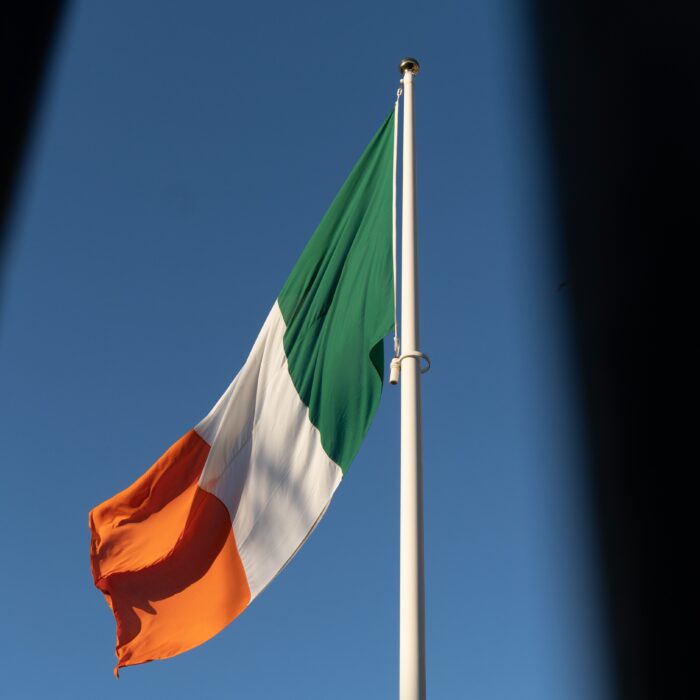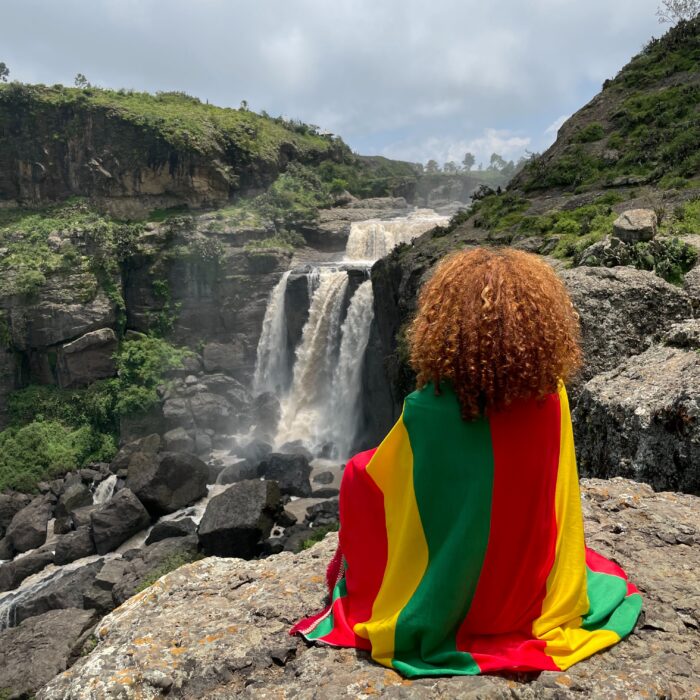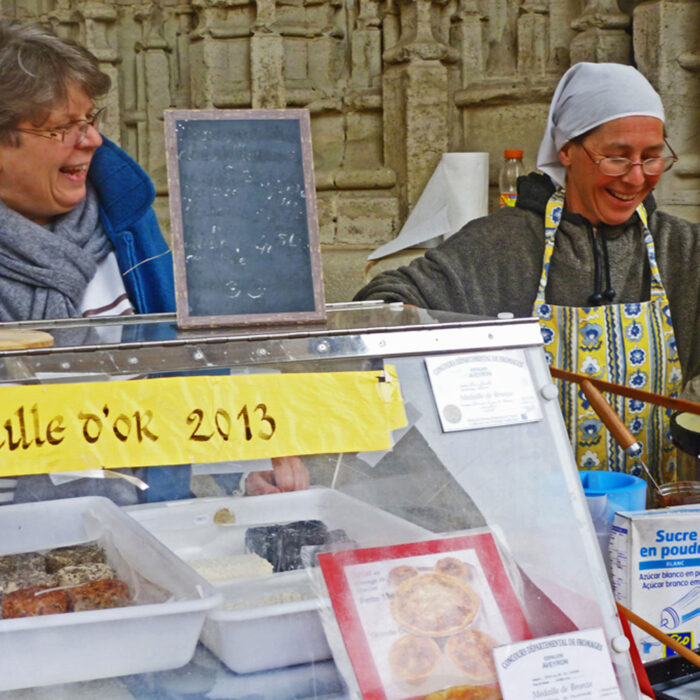You have no items in your cart. Want to get some nice things?
Go shopping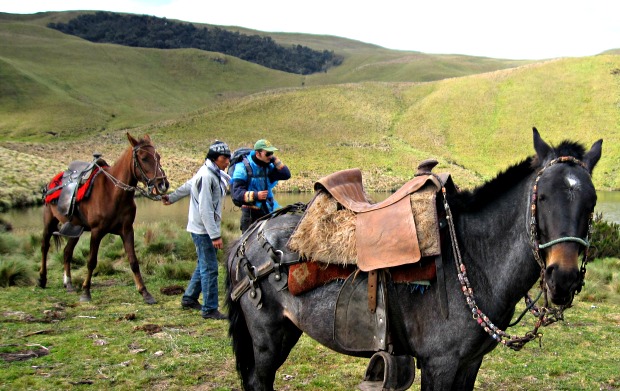
A condor overhead searches with hunger among the paja grass, funnelling through the turbulence toward the jutting mantle of the mountain plain. The horse below me bends to chew patches of grass scattered among the moss. She eyes me with trepidation, pulling back her head as I move to touch her face. Her eyes never leave me, her ears are ever taut: she bends, chomps, stares, and repeats. Another mouthful of reedy blades and we move on, hopscotching terrain.
***
Cold air, lungfuls of burn as we leave the horses and hike up a peak on foot. The páramo is quiet apart from the restless wind. The open space seems overwhelmingly infinite. Fast clouds move among the green hills, capturing us in pockets of mist and then move on. I’m a Peace Corps volunteer and I’m leaving soon. We are here in the páramo near Cahuasquí, la Isla, a plateau surrounded on all sides by deep ravines and endless hills. It’s my best friend Ryan’s site. He’s been riding horses and working in Ecotourism for two years while I’ve lived in a small jungle city working with a family planning clinic.
My other friend Jake and the guides are ahead, working through the acid forming in their legs.
Go on, I say to Ryan who looks back at me trailing behind—I’ll wait here.
It’s only a hundred metres from the summit but I need to be still now. The wind whips through the valley. Grey obscures the sunlight at this altitude. I hide from the wind behind a boulder and wait for them to come back down.
***
I look up from the couch and see M, my girlfriend, asleep in the hospital bed. An IV hangs out of her arm next to her frizzy almond hair. She has a delicate, vulnerable look and even here, her face unwashed, it’s hard to ignore her beauty. We’re in the best hospital in Quito because unbearable pain shoots from her jaw. I love her and I’m scared, but not that she’ll die, not that. The doctors look at me, she looks at me, to ask the right questions and mostly I don’t. On day five I tell her I need some air, to walk around. Tiff, her friend, is visiting and sees the confusion on her face. Tiff says, let him go. I hear the last part of the sentence she doesn’t say: M, he’ll be back, he’s not going anywhere.
***
We never slip, the horse and I. A good team although we never asked for each other and the love is one-sided. We snicker as Jake’s horse loses her footing, as Ryan’s beast ahead is unsure of the destination. We’ll take the lead, my horse says, and we clod ahead of the pack. Sometimes when we stop I scratch her ears and sides where the reins and saddle rub and itch. She begrudges me a snort I hear as an acknowledgment of my existence. I exist, I repeat back. Time passes slowly in the páramo. Our warm blood palpates through the mountains now, amid the cold, continuous rain. We tuck our chins low into our ponchos as we ride, trying to contain the remaining heat within.
***
The three of us leave camp and run up the hill toward the thicket to gather wood for fire. We were men a moment ago and now we are boys. Beware of the Duendes, the Ecuadorians call to us with smiles. Wood Elves, Ryan explains.
We separate to pull among the stubborn roots and rotting branches of the thicket, to search for desiccate wood and sapless tree limbs but incessant rain breeds deep sinuous roots. We meet back in the clearing with our meagre armfuls. See any Wood Elves? we ask each other. We take a photo on a foundered tree using a timer. Looking over the landscape for a moment we pause in awe and watch each other without saying any words. One by one we return in silence with our wet branches and martyred twigs to the camp below.
***
I jerk the reins toward the others ahead mucking through the swampish earth. But you see, they are over there, I say in a gentle tone to my horse. She resists my pull and continues on the path she’s chosen, stubborn and obstinate. I know these mountains, these hills, these valleys—I know these paja-filled plains, she is saying to me like one says to an insolent child. I’ve learned to pick my battles. I trust you, I say, we’ll try it your way this time. I know in the end we’ll arrive in the same place, or we won’t.
We camp by the crater lake where someone takes the horses to the water’s edge and ties them up to feed and drink. We feel the bitter wind and empty night-chill flowing through the valley. In the distance the light fades as we sit by the fire and pass the flask of aguardiente. One of the guides brings us beans and rice. A story begins in Spanish as we stare, with liquor-loosened thoughts, into the dazzle of crackling flame. Each of us lost in our own labyrinth.
***
I talk with M’s mom outside, walking through the hills of Quito and stop to buy flowers and a stuffed bear. I sign the card Mom. When I return to her room Tiff is gone. M says hi softly as I shut the door behind me. She sees what I’ve brought her, sees the card I sign from her mom, and the note I’ve transcribed. She holds the stuffed animal, hugs it and reaches out for me. I crawl into bed with her and kiss her forehead. We pull the laptop onto the tray on the side of the bed and set up a movie. I whisper to her, it will be okay. I hope it will. She exhales and I know without her having to say it, how much she hates needing me—hates needing anyone. “I’m sorry,” she says.
***
I awake in the tent. In the dawn light, peeking through the translucent mesh, I watch the others huddled close in sleeping bags. I try to close my eyes again but I think of her, of waking next to her, of her heat—of the sudden, unexpected intensity that last time we made love a few weeks ago—of the shock of remembering now her forever-distant body. Already the separation grows between us, unwinding, ripping, snapped away by time and space and words. I wait in silence for the others to rise so we can move from here to there, to wherever the horses carry us today.
***
On the last day of the journey we untie the horses and with stiff legs kick onto the beasts. It’s been three days of riding hard. My horse speeds up when she realises the path leads home. Each trot cracks my tailbone into the saddle. The horses call to each other and pass the word that we are headed home. I pull up on the reins to slow her to a walk. She snorts and stares into my eyes. Just a little patience, I say. She listens for a moment and then gallops again. She can’t help it. The world is full of narcissist beasts.
We climb down switchbacks we rose before. Sticky blood forms where my tailbone rubs raw. It’s painful to sit flush on the saddle and yet my legs are too weak to raise myself above it. Can’t you sense I’m in pain? I say to the horse, but she isn’t listening.
***
We ride on following the narrow ledge an hour from town. I’m breathing hard as the horse gallops. Each time I pull up on the reins she snaps her forehead back and drives into my shin, saying, let me run home! It doesn’t hurt but the rebellion surprises me. I’d let her run but the pain of each stride stings into my bones. She bolts as the narrow path opens. A tree branch knocks my face. I hang off her side as the others are far ahead and behind. I yell now and the shock of my voice slows her. I jump off and stand gripping the rope. Flustered, I wait for the others to catch up in the clearing. I hold her bit and let her know I’m in charge again—little taut jerks yelling, Hey! Hey! Hey! I grip her reins close in anger and force her to look into my eyes. I’m the beast now we both realise. I loosen my grip.
Are you okay? Ryan asks, riding up with a look of concern. I’m fine, I say as he turns his horse back toward the path. He gallops on. My horse snickers, impatient, as I pull myself up slowly. Jake and the others race past, a blur. My horse bolts once more after the others as I grit through the pain and surrender to the moment, letting her gallop. I whoop and yell, manic and uncontrolled as we race in pursuit of the others.
***
Outside Ryan’s house I lean on my bag and stare weary into the cobblestone and chicken-filled street. Aches and pains are brought forth from my body, from places I didn’t know held them like my back and arms. The mind slows, returned to things beyond the journey I’ve just finished—to home—to that other home that came before Quinindé and Ecuador—to the bland poverty scrubbed suburbs of California. But the thought forward lasts only a moment before I hear M’s voice saying over the phone, “Goodbye.” I hadn’t meant to come on this trip with Ryan and Jake; I joined at the last moment. I was supposed to be with M in Cuenca for my last days in Ecuador. But that is over now, both my time in Ecuador and my relationship with M. This is what I am left with: a sense of journey’s ending.
***
I travel back to Quinindé from Cahuasquí for one final night to gather my things and depart for good. On the bus, a grey, speckled kitten mews in the lap of the woman next to me. A small baby cries as it’s changed behind me. Reggaetón blares from a speaker overhead. People sit and stare out the window, waiting for the driver and ayudante to finish their lunch, to return to the bus so we can wind down the mountains back to the dizzying heat of Esmeraldas. Where we stopped is a fritada stand. Thick joints of pork fry among pig fat and grizzled guts. Rain sings down on the roof of the carriage, the bus passengers idle and we stare together into the road worried about landslides, broken axels, flooded crops and sick children. Worried about love, money and jobs. Of the hours and days of the journey still to go. Of the distance between the here and now and the uncertain future in life and love we all hopscotch toward.
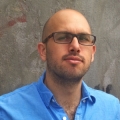
About Geoff Bendeck
Geoff Bendeck lives in New York City where he is a student in the MFA Writing Program at Sarah Lawrence College. His essays have appeared recently at thecommononline.org and washingtonian.com. He can be reached at geoff.bendeck@gmail.com.

